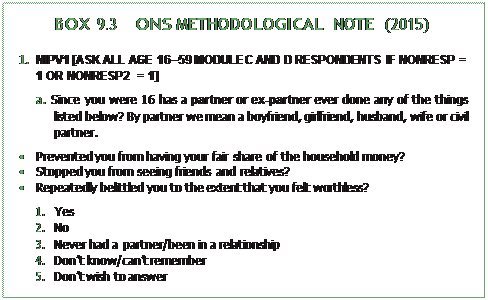 |
Large-scale surveys:the crime survey for England and Wales (formerly the British crime survey) and its approach to sensitive topics
|
|
|
|
The Crime Survey for England and Wales (CSEW) (formerly The British Crime Survey (BCS)) provides annual data about the nature and extent of crime and victimization. The survey collects data about individual experiences of victimiza- tion and the information gathered informs government policy. In terms of sensitive research, the CSEW has it all: sensitive topics (such as sexual assault and domestic violence); vulnerable populations (children); a responsibility to include hard-to-reach groups; and the potential to reveal incriminating information. The survey consists of a set of core ‘modules’ that are asked of all respondents in face- to-face interviews, a set of secondary modules asked of sub-samples of respondents in the interview, and a final set of self-completion modules for all respondents. The self-completion modules deal with the most sensitive issues addressed in the survey. So, how does the CSEW approach questions on topics that may be considered particularly sensitive, such as intimate personal violence including partner abuse, family abuse, sexual assault, coercive and controlling behaviour and stalking?
The BCS and CSEW have included questions on intimate personal violence since 2001. The questions are consulted on, updated and developed regularly (cf. Campbell-Hall et al., 2010; Hall and Smith, 2011; Home Office, 2012) in line with changing definitions and legislation, most recently for the 2012/13 CSEW as part of an Intimate Personal Violence split-sample experiment (CSEW 2012/12). The questions are located in a separate self-completion module entitled ‘Intimate Personal Violence (IPV)’. This separation of the module was prompted by concerns raised in earlier waves of the survey that the explicit nature of the questions affected responses to subsequent questions (ONS, 2015). All respondents aged 16–59 are asked to com- plete this section. The module comprises over 20 pages of questions covering aspects of the respondents’ experiences of and attitudes to domestic violence and sexual assault, and because of their sensitive nature they are completed on a laptop. This approach is intended to minimize embarrassment to the respondent and improve the reporting rate. The questions are carefully phrased, free from jargon and easily understood by respondents of all ages (see Box 9. 3), and the module reiterates that the respondent does not have to answer the questions: ‘Remember, if the questions upset you in any way you can just pass by them by pressing “Don’t wish to answer”. However, we hope you will continue to the end’ (Hall and Smith, 2011: 34).
In addition, a number of procedural safeguards have been put in place to ensure
an ethical approach. For example, new researchers are required to attend full briefing sessions and further refresher courses are compulsorily attended by the more expe- rienced researchers. Confidentiality of data is ensured, and advice on how to obtain further help is offered to respondents as necessary.
|
|
|
 |
2.  NIPV3 [ASK ALL AGE 16–59 MODULE C AND D RESPONDENTS IF (NONRESP = 1 OR NONRESP2 = 1) AND NIPV1 NE 3]
NIPV3 [ASK ALL AGE 16–59 MODULE C AND D RESPONDENTS IF (NONRESP = 1 OR NONRESP2 = 1) AND NIPV1 NE 3]
a. Since you were 16 has a partner or ex-partner ever frightened or threatened you in any way? For example, they may ha ve threatened to hurt you, to kill you, to use a weapon on you, or to hurt someone close to you [such as your children]?
1. Yes
2. No
3. Don’t know/can’t remember
4. Don’t wish to answer
3. NIPV5 [ASK ALL AGE 16–59 MODULE C AND D RESPONDENTS IF (NONRESP = 1 OR NONRESP2 = 1) AND NIPV3 NE 3]
a. Since you were 16 has a partner or ex-partner ever used force on you? For example, they may ha ve pushed you, slapped you, hit, punched or kicked you, choked you or used a weapon against you.
1. Yes
2. No
3. Don’t know/can’t remember
4. Don’t wish to answer
4. NIPV533 [ASK ALL AGE 16–59 MODULE C AND D RESPONDENTS IF NONRESP = 1 OR NONRESP2 = 1]
a. Since the age of 16 has anyone ever sent you more than one unwanted letter, text message or card that was either obscene or threatening and which caused you fear, alarm or distress? This may have been a partner, a family member, a friend or work colleague, someone you knew casually, or a stranger.
1. Yes
2. No
3. Don’t know/can’t remember
4. Don’t wish to answer
|
|
|


